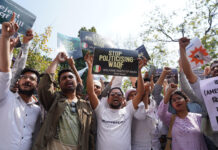They were all given 15-month suspended jail sentences and ordered to pay €165,000 (£145,000) each, with half the sum suspended.
They were accused of detaining more than 20 servants they brought with them during a visit in 2008.
However, they were acquitted of the more serious charge of inhumane treatment.
The eight princesses had denied all the charges.
Their lawyer, Stephen Monod, said he was “satisfied to note that the Belgian justice has appropriately assessed this case which has generated many misconceptions for nearly 10 years”.
He was could not confirm that his clients would pay their fines, saying they had not yet decided whether to appeal.
Subscribe to our newsletter and stay updated on the latest news and updates from around the Muslim world!
Sheikha Hamda al-Nahyan and her seven daughters did not attend the trial and human rights activists said it was highly unlikely that the UAE would extradite them if they were imprisoned.
Slavery
This case first came to light when one of the servants escaped from the hotel where the princesses had rented a floor of luxury suites.
They said they were forced to be available for work 24 hours a day, were given no days off, were not allowed to leave the hotel, had to sleep on the floor and were forced to eat the princesses’ leftover meals.
The case took nine years to get started due to the legal challenges to proceedings by the defence.
During the trial, Nicholas McGeehan, an expert on migrant workers in the Gulf for Human Rights Watch, told the BBC that it would be “hugely significant” if one of the wealthiest families in the world was publicly linked with trafficking and slavery.
He argued that despite being abolished in law, domestic slavery continues in Gulf states – “perpetuated by ruling elites for whom it serves an important societal purpose in conferring status…It’s top-down and tolerated.”






















